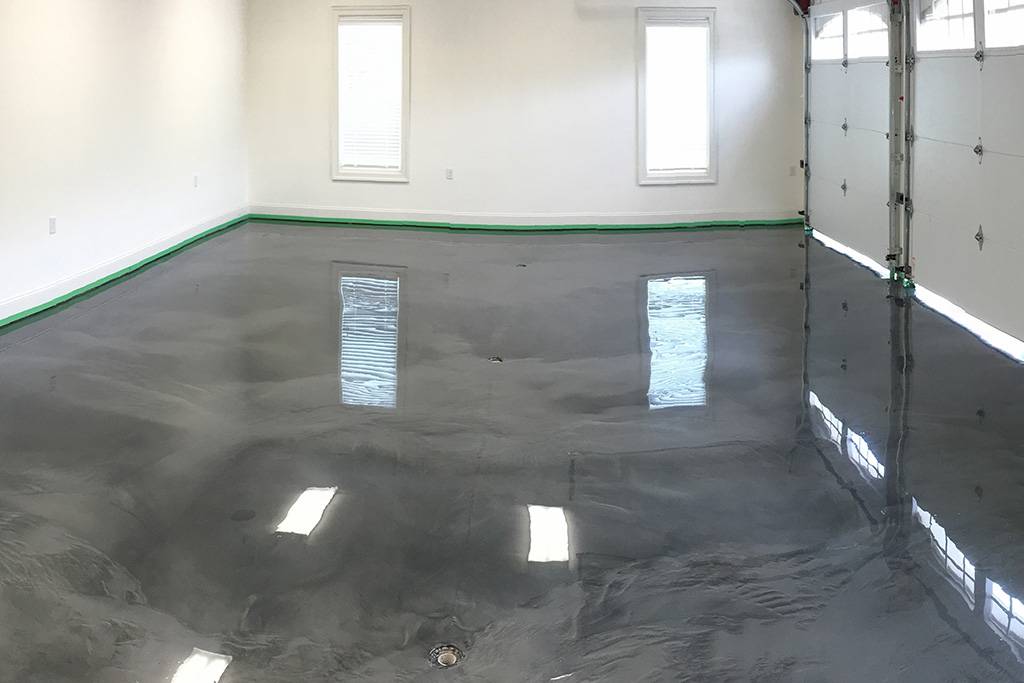Select from a variety of office flooring ideas suited for small, medium, large or even home offices. Browse flooring options that enhance your workspace and based on key considerations like price, light or heavy foot traffic, installation time and maintenance costs.
Office Flooring Options
When choosing flooring for your office, you have several types of commercial flooring to consider. Each with its own advantages and features:
Hardwood Floors
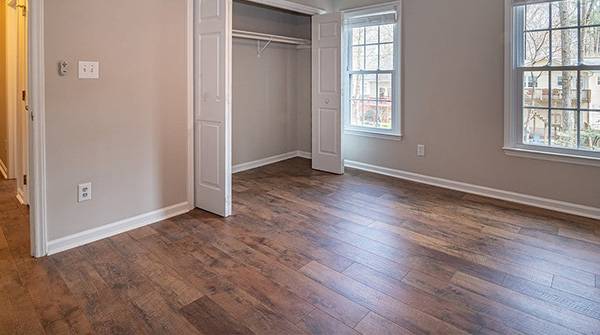
- Provides an elegant and timeless appeal.
- Available in various wood species, colors, and finishes.
- Can be refinished multiple times, extending its lifespan.
- Also referred to as ‘Wood Flooring’.
Laminate Floors
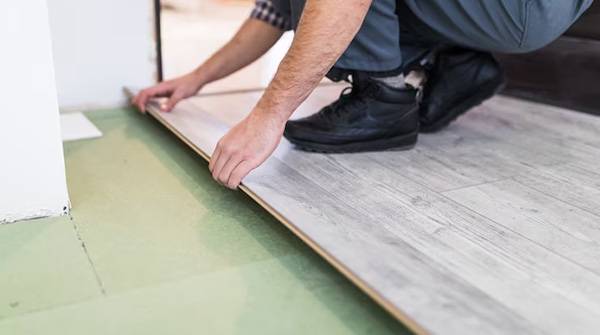
- A cost-effective alternative to hardwood.
- Offers similar appearance with increased durability.
- Resistant to scratches, dents, and moisture.
Vinyl Floors

- Versatile and low-maintenance option.
- Available in various designs mimicking wood, stone, or tile.
- Highly resistant to water, stains, and scratches.
- Pro Tip: Try out a luxury vinyl tile sample.
Carpet Floors
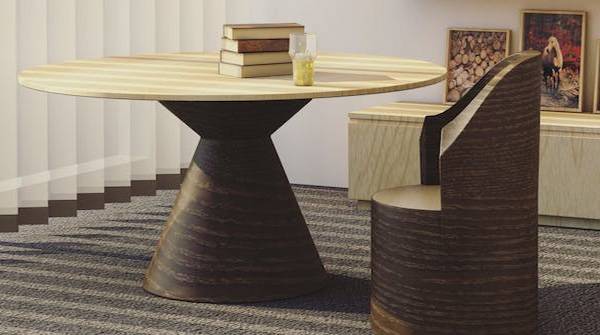
- Absorbs excess noise, creating a more comfortable environment.
- Wide range of colors, patterns, and materials available.
- Requires regular cleaning and maintenance.
Epoxy Floors
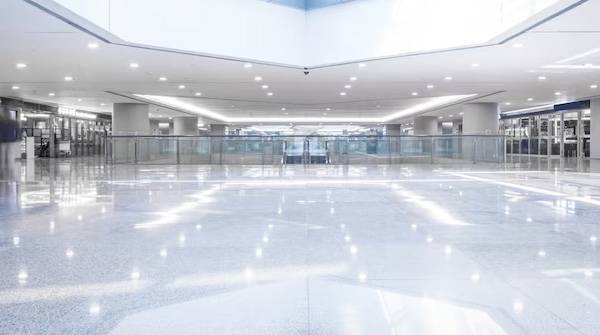
- Durable and seamless option, ideal for heavy machinery areas.
- Smooth, non-porous surface, easy to clean and maintain.
- Customizable with various colors and finishes.
Tile Floors
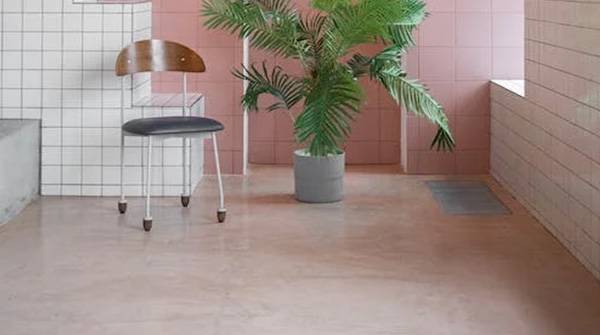
- Durable and low-maintenance choice.
- Available in natural stone, porcelain, or ceramics.
- Resistant to wear and tear but may be less comfortable underfoot.
Other Options for Commercial Flooring

- Natural Stone, Marble Floor, Glass Floor, Polished Concrete, Luxury Vinyl, Carpet Tiles, Synthetic Wood, etc
- You can also combine multiple type of flooring to create a unique pattern and impress visitors or clients.
Factors to Consider
When deciding on the best flooring for your office use, consider several key factors that will impact the overall performance and functionality of the space:
Budget
- Determine a budget that balances aesthetics, installation, and maintenance costs.
- Analyze long-term expenses to make a cost-effective choice calculated based on the total space.
Durability
- Select a material that can withstand daily foot traffic and office equipment use.
- Opt for durable flooring to reduce the need for frequent replacements.
Maintenance
- Choose a flooring type that is easy to clean and maintain.
- Consider the time and resources required for upkeep.
Design and Aesthetics
- Match the flooring design to your office’s overall aesthetic and brand image.
- Create a visually appealing and inviting workspace for employees and clients.
Office Functionality
- Ensure the flooring material complements the office layout and facilitates efficient space utilization.
- Consider the comfort and productivity of employees when making a flooring choice.
Putting these into consideration, businesses can make an informed decision and choose the most suitable flooring options needs. Flooring professionals can provide valuable insights to help make the best flooring choice including time/cost to install and maintain specific to your use case.
How to maintain your office flooring?
We analyze different types of flooring material options to help you navigate to the best flooring that work for businesses and proves to be a good choice in the long term.
Hardwood Flooring
- Sweep or vacuum regularly.
- Clean spills immediately with a damp cloth.
- Use furniture pads to prevent scratching.
- Refinish wood every few years.
Laminate Flooring
- Sweep or vacuum regularly.
- Clean spills promptly with a damp cloth.
- Avoid excessive water and abrasive cleaners.
- Use furniture pads to avoid scratches on the laminate floor.
Vinyl Flooring
- Sweep or vacuum regularly.
- Clean spills immediately with mild detergent.
- Avoid harsh chemicals and abrasive scrubbing.
- Use furniture pads for protection of vinyl floors.
Carpet Flooring
- Vacuum regularly.
- Clean spills immediately with carpet cleaner.
- Use doormats at entryways.
- Schedule professional cleaning.
Epoxy Flooring
- Sweep or dust mop regularly.
- Clean spills with damp mop and mild detergent.
- Avoid harsh chemicals and abrasives.
- Periodically inspect and reapply topcoat.
Tile Flooring
- Sweep or vacuum regularly.
- Clean spills with damp mop and mild detergent.
- Avoid abrasive cleaners or scouring pads.
- Seal grout lines and repair any damage.
Eco-Friendly Flooring Options
For environmentally friendly office spaces, these are the best flooring options that can replace traditional or other types of flooring:
Bamboo Flooring
- Bamboo is a sustainable choice, as it is one of the fastest-growing plants, replenishing quickly.
- It offers strength and visual appeal, making it ideal for commercial offices.
- With prices ranging from $1.50 to $11 per square foot, it’s a cheap option.
Cork Flooring
- Cork is fire-resistant, mold-resistant, and harvested without harming the tree.
- While it may have limited design options, it is an excellent eco-friendly choice.
- Cork is lightweight, easy to install, and hypoallergenic floor.
Recycled Flooring Materials
- Opt for sustainable hardwoods with responsible sourcing, like FSC-certified American hardwood.
- Eco-friendly carpets with low VOCs, non-toxic dyes, and easily separable backing promote better indoor air quality and recyclability.
Companies tend to choose flooring options for common areas which are eco-friendly and accessible to visitors, in order to align their brand essence with their commitment to sustainability and environmental responsibility. Not only will these flooring systems reduce your ecological footprint, but they can also enhance the aesthetics and functionality of your workspace.
Flooring Installation
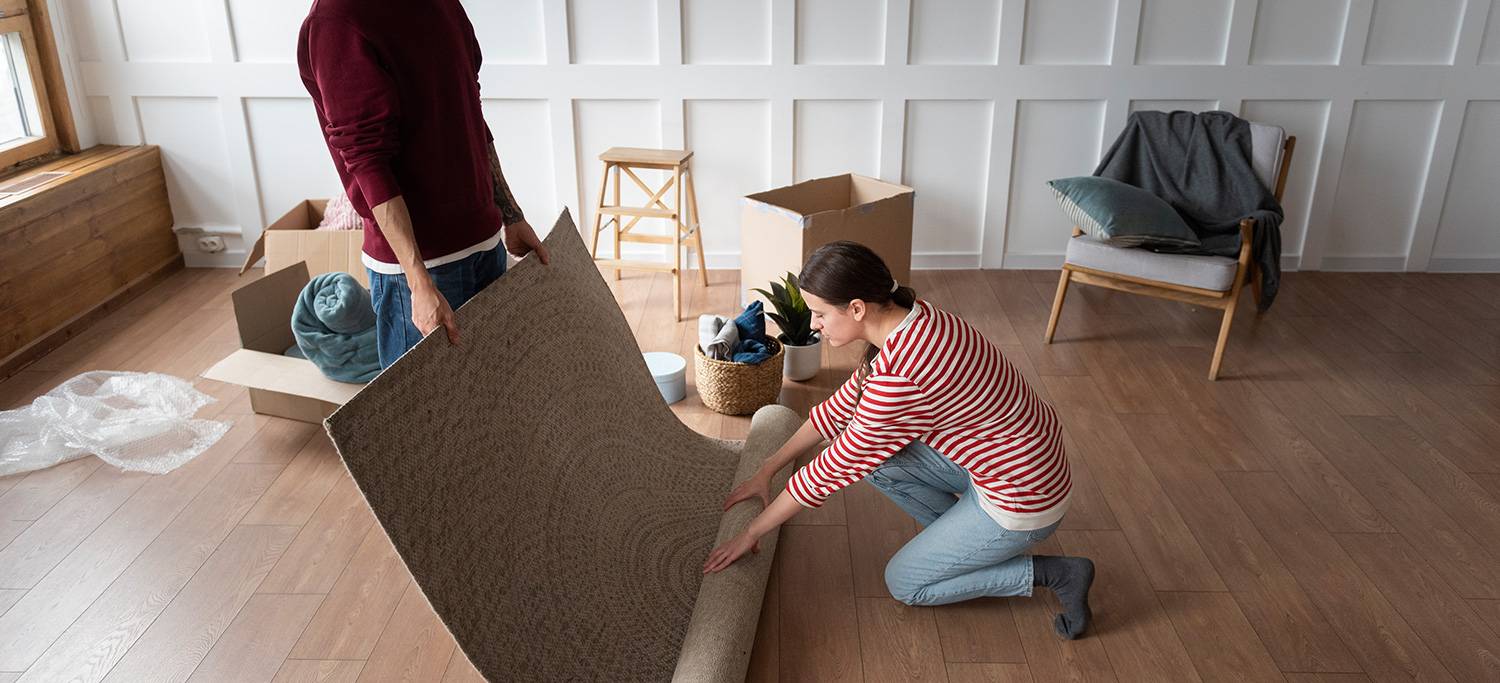
When it comes to installing office flooring, you have two options to consider: DIY or professional installation.
DIY Installation
- DIY may seem cost-effective, but it requires skill, time, and the right tools.
- It’s best suited for small office spaces or home offices with a simple flooring designs.
- Keep in mind that improper installation can lead to costly repairs down the line.
Professional Installation
- Hiring professionals ensures expertise, efficiency, and high-quality workmanship.
- It’s a wise investment for large offices or complex flooring designs especially ones with public space. (Pro Tip: Consider slip resistant commercial flooring if you have a lot of staff or public visitors).
- Professionals can handle subfloor evaluations, proper floor preparation, and address any challenges for any office flooring options that you finalize.
Preparation
A crucial step in successful flooring installation is proper preparation:
- Evaluate the Subfloor:
- Assess the condition of the existing subfloor for any repairs or leveling needed.
- Remove Old Flooring:
- Carefully remove the old flooring without damaging the subfloor.
- Clean and Dry the Subfloor:
- Thoroughly clean the subfloor to ensure it’s free from debris and moisture.
Timeline
The timeline for flooring installation depends on various factors:
- Flooring Material:
- The type of flooring material you choose can impact the installation timeline.
- Office Size:
- The covered area (square footage) will determine the time required for installation.
- Complexity of Design:
- Elaborate patterns or custom designs may require additional time.
Always consider the timeline for installation when planning your office renovation to minimize disruptions to daily operations. Consulting with a professional installer can help you determine the most accurate timeline for your specific project. By taking the time to prepare adequately and making the right installation choice, you can ensure a smooth and successful flooring project.
Dealing with Noise and Acoustics:
Maintaining a quiet and productive office environment requires addressing noise and acoustics effectively.
Soundproofing
- Use acoustic wall panels to reduce noise by absorbing sound reflections.
- Strategically place furniture like bookcases, filing cabinets, and curtains to dampen sound.
Underlayment Options
- Opt for underlayment materials like rubber, cork, or foam to reduce noise from foot traffic.
- These materials provide sound absorption and insulation, enhancing employee comfort.
Safety Measures
Prioritizing safety is essential for any office space. Implement the following safety measures for your office flooring:
- Slip Resistance:
- Choose floor materials with high slip resistance to prevent accidents.
- Keep workspaces clean and dry, and use signage to mark potential hazards.
- Fire Resistance:
- Select flooring with a high fire-resistance rating to protect employees and assets.
- Ensure your office meets fire safety regulations and have valid fire certificates where required.
- Air Quality Control:
- Opt for flooring materials with low VOC emissions to maintain good indoor air quality.
- Proper ventilation and regular maintenance will help minimize allergens and pollutants.
Frequently Asked Questions
What types of flooring are suitable for offices?
Hardwood, laminate, vinyl, carpet, and tiles are all suitable flooring options for offices.
Consider factors like aesthetics, durability, and maintenance requirements when choosing the right flooring for your office.
Which flooring materials are most durable?
Vinyl, ceramic tiles, and certain hardwood types are considered highly durable flooring options.
These materials can withstand wear and tear, making them ideal for busy office spaces.
How do office chairs impact commercial flooring?
Rolling chairs can cause wear and damage to certain flooring materials over time.
Using chair mats or replaceable area rugs can protect the floor from chair damage.
What factors should be considered for home office flooring?
Home offices are generally smaller and can adapt almost all kinds of commercial flooring. Select budget, sound absorbent and cost to maintain as the first 2 decision making points. Hardwood Floors are generally a practical choice.
Which flooring brands are recommended for commercial office use?
Reputable flooring brands for commercial offices include Shaw, Mohawk, Armstrong, Mannington, and Interface. Research and compare multiple options to find the best fit for your office needs.

